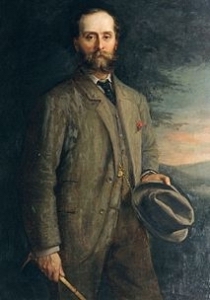Sir Henry Ralph Fletcher-Vane, 4th Baronet facts for kids
Quick facts for kids
Sir
Henry Ralph Fletcher-Vane
|
|
|---|---|
 |
|
| Born | 13 January 1830 Hutton in the Forest, England
|
| Died | 1908 Hutton in the Forest, England
|
| Education | Eton College |
| Alma mater | Christ Church, Oxford |
| Relatives | Ancestor: Sir Henry Vane the Elder |
Sir Henry Ralph Fletcher-Vane (13 January 1830 – 1908) was the eldest son of Sir Francis Fletcher Vane, 3rd Baronet, and his wife, Diana Olivia (née Beauclerk). He was a Deputy Lieutenant and Justice of the Peace for Westmoreland and Cumberland and appointed High Sheriff of Cumberland in 1856. He was also a County Alderman for Cumberland and was an officer in the Westmorland and Cumberland Yeomanry, commanding the regiment from 1879 until 1891 when he was appointed the regiment's Honorary Colonel. He was the fourth Baronet of Hutton and the first cousin of Sir Francis Vane.
Life
Henry Ralph Fletcher Vane was born on 13 January 1830, educated at Eton and Christ Church, Oxford, and succeeded his father to the baronetcy in 1842 at the tender age of 12.
In 1871, at the age of 41, Sir Henry married Margaret Maxwell Gladstone at Glencairn in Dumfries, Scotland. Margaret was the daughter of Thomas Steuart Gladstone, of Capenoch, co. Dumfries; Thomas Gladstone was the eldest son of the Liverpool based merchant and plantation owner, Robert Gladstone, and his wife, Catherine (née Steuart); he was also the first cousin of William Ewart Gladstone, the Liberal Prime Minister who was a contemporary of Sir Henry's uncle at Eton. In 1835, Thomas and two of his brothers, Robert and William, became the trustees and executors of their father's will and guardians of their younger siblings. He was responsible for managing the Jamaican properties and plantations and for dividing the estate equally between the siblings. In his own right, Thomas Gladstone was a merchant and broker in the Liverpool firm of Gladstone and Sergeantson through which he expanded his commercial interests into South American Guano, Australian farming as well as trade with Asia. In later life he retired to Capenoch house, Dumfriesshire. His younger brother Adam Steuart Gladstone became an East India merchant.
In 1872, shortly after his marriage, Sir Henry Ralph Fletcher Vane was embroiled in unpleasant litigation. The litigation was initiated by his uncle, Frederick Henry Vane, the youngest son of his grandfather, Sir Frederick Fletcher Vane, 2nd Baronet. Ironically, Sir Henry may have met his wife through the introduction of Frederick Henry Vane who had been at Eton with William Ewart Gladstone.
The litigation was first reported in The Times on 6 November 1872. The spoils at stake were the family estates in Cumberland and Westmorland. The case made by the bill was that Sir Francis Fletcher Vane, 3rd Baronet, had been born out of wedlock. There are two accounts of this circumstance of his birth.
The above account is not corroborated by any of the extant law reports of the trial.
In the 1881 census, Sir Henry and his wife were living at 35 Cadogan Place in Chelsea, London where he describes his occupation as magistrate, and in the 1891 census he was living in Brighton. Debrett's Baronetage of 1905 states Sir Henry's seats as Hutton in the Forest and Scarness Cottage in Bassenthwaite. He was by then a member of the Carlton Club and Arthur's.
Sir Henry Ralph Vane died at Hutton in the Forest on 15 June 1908 and probate was granted in Carlisle on 7 August 1908 to the Right Honourable Henry de Vere Vane, Baron Barnard, the Hon. William Lyonel Vane and Edward Lamb Waugh. Sir Henry's effects were valued at £107,747 or £11,662,072 in 2015 prices.
The executors of the estate were as follows:
• The Rt. Hon. Henry de Vere Vane, 9th Baron Barnard (10 May 1854 – 28 December 1918), the son of Sir Henry Morgan Vane and Louisa, youngest daughter of the Rev. Richard Farrer of Ashley, Northamptonshire;
• The Hon. William Lyonel Vane, brother of the Rt. Hon. Henry de Vere Vane, 9th Baron Barnard (born 30 August 1859); and
• Edward Lamb Waugh (born 14 August 1851 at Cockermouth in Cumberland), the eldest son of Edward Waugh, a solicitor, and Mary Jane Waugh.
At the time of Sir Henry's death in 1908, the heir to the baronetcy was his first cousin, Francis Patrick Fletcher Vane, born 1861, a grandson of Sir Frederick Fletcher Vane, 2nd Baronet, by Sir Frederick's youngest son, Frederick Henry Vane. The litigation challenging Sir Henry Ralph Vane's legitimacy to the Hutton estates was conducted in the 1870s and was prosecuted by Francis's father. At that time, it is not clear to what extent the litigation would cost Francis his inheritance. Certainly, the literature of Hutton in the Forest makes no mention of Sir Francis Patrick Fletcher Vane, 5th Baronet.
Sir Francis Fletcher Vane did survive the Dowager Lady Vane (widow of the 4th Baronet), who died at Scarness Cottage in Bassenthwaite in 1916, and he survived Major-General Frederick Drummond Vincent Wing CB, who was killed in action during the First World War in 1915. In terms of the executors, Edward Lamb Waugh died on 27 October 1917, Henry de Vere Vane died on 28 December 1918 and William Lyonel Vane died on 23 January 1920. In 1931, the Hutton estates were gifted to William Fletcher-Vane, 1st Baron Inglewood, three years before the death of Sir Francis Patrick Fletcher Vane, 5th Bt.

